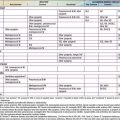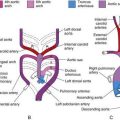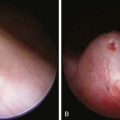Chapter 385 α1-Antitrypsin Deficiency and Emphysema
Although it rarely causes lung disease in children, homozygous deficiency of α1-antitrypsin (α-AT) is an important cause of early-onset severe panacinar pulmonary emphysema in adults in the 3rd and 4th decades of life and an important cause of liver disease in children (Chapter 349.5). It has been associated with panniculitis and vasculitis in adults.
Pathogenesis
The type and concentration of α1-AT are inherited as a series of codominant alleles on chromosomal segment 14q31-32.3. See Chapter 349.5 for discussion of genotypes and liver disease. The autosomal recessive deficiency affects 1/1,600-2,500 people, or ∼100,000 people in the USA but is underdiagnosed. It occurs most commonly in whites of Northern European ancestry, but recent surveys reveal significant prevalence in populations from the Middle East and North Africa, Central and Southern Africa, and Central and Southeast Asia. Worldwide there are an estimated 116,000,000 carriers and 1,100,000 subjects with severe α1-AT deficiency. The normal α1-AT PiM protein is secreted by the liver into the circulation at a rate of ∼34 mg/kg/day; it is also produced by lung epithelial cells and monocytes. Mutant protein is not produced (null), or is misfolded (PiZ and others); it can polymerize in the endoplasmic reticulum or be degraded, with subsequent low serum levels. Early adult-onset emphysema associated with α1-AT deficiency occurs most commonly with PiZZ (mutation in SERPINA1 gene), although Pi (null) (null) and, to a lesser extent, other mutant Pi types such as SZ have been associated with emphysema.
American Thoracic Society/European Respiratory Society statement. Standards for the diagnosis and management of individuals with alpha-1 antitrypsin deficiency. Am J Respir Crit Care Med. 2003;168:818-900.
Brand P, Schulte M, Wencker M, et al. Lung deposition of inhaled α1-proteinase inhibitor in CF and α1-antitrypsin deficiency. Eur Respir J. 2009;34(2):354-360.
de Serres FJ. Worldwide racial and ethnic distribution of α1-antitrypsin deficiency. Summary of an analysis of published genetic epidemiology surveys. Chest. 2002;122:1818-1829.
Dirksen A, Piitulainen E, Parr DG, et al. Exploring the role of CT densitometry: a randomized study of augmentation therapy in alpha-1 antitrypsin deficiency. Eur Respir J. 2009;33:1345-1353.
Fregonese L, Stolk J. Hereditary alpha-1-antitrypsin deficiency and its clinical consequences. Orphanet J Rare Dis. 2008;3:16-25.
Liqun Wang R, McLaughlin T, Cossette T, et al. Recombinant AAV serotype and capsid mutant comparison for pulmonary gene transfer of alpha-1-antitrypsin using invasive and noninvasive delivery. Mol Ther. 2009;17:81-87.
Luisetti M, Seersholm N. Alpha1-antitrypsin deficiency. 1: epidemiology of alpha1-antitrypsin deficiency. Thorax. 2004;59:164-169.
Sandhaus RA, Turino G, Stocks J, et al. Alpha 1-antitrypsin augmentation therapy for PiMZ heterozygotes: a cautionary note. Chest. 2008;134:831-834.
Strange C, Moseley MA, Jones Y, et al. Genetic testing of minors for alpha 1-antitrypsin deficiency. Arch Pediatr Adolesc Med. 2006;160:531-534.






